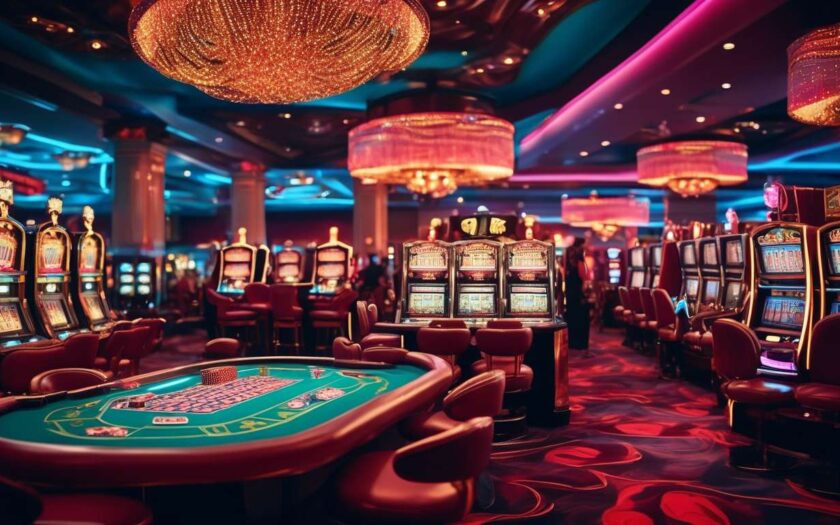When we step into the vibrant, energetic world of a casino, it is as if we are entering a carefully crafted universe designed to captivate and engage us. The flashing lights, the rhythmic sounds of slot machines, and the palpable excitement in the air all contribute to an experience that is both thrilling and mesmerizing.
As we navigate this environment, we find ourselves drawn to the allure of chance and the promise of fortune. But what is it about casinos that so effectively captures our attention and keeps us coming back for more?
Together, we can explore the fascinating realm of casino psychology to uncover the subtle techniques and strategies employed to influence our behavior. By understanding the psychological principles at play, we can become more aware of our own responses and make more informed decisions as we indulge in the games of chance that beckon us from every corner.
Key psychological principles at play in casinos include:
- Sensory stimulation: Bright lights and sounds are designed to keep players awake and engaged.
- Near-miss effect: Slot machines often show results that are close to a win, encouraging continued play.
- Reward systems: Small, frequent wins keep players motivated and optimistic.
- Time perception: Lack of clocks and windows makes it easy to lose track of time, promoting longer stays.
By being aware of these strategies, we can better navigate the casino environment and maintain control over our gaming experiences.
The Power of Visuals
Visual elements in casinos are meticulously curated to captivate players and keep them engaged. We’re drawn in by vibrant colors, flashing lights, and intricate designs. These visual stimuli aren’t just for show; they’re carefully chosen to enhance our gaming experience. By triggering our cognitive biases, these elements can subtly influence our decision-making process.
Psychological Impact of Colors:
- Bright reds and golds can make us feel more optimistic and willing to take risks.
- These colors are chosen for their psychological impact, not randomly.
Engagement through Visual Stimulation:
- We’re more likely to stay at a table or slot machine when visually stimulated.
- The environment is designed to make us feel comfortable and at home, like part of an exclusive club.
Reinforcement of Visual Cues:
- Encourages us to keep playing.
- Creates a sense of being part of a larger group, swept up in the shared excitement and possibility the casino offers.
Sound and Its Influence
The sounds in casinos, from the chiming of slot machines to the murmur of excited conversations, are expertly designed to enhance our gaming experience and keep us engaged. These auditory cues, much like the visual stimuli around us, work to create an immersive environment where we feel part of a vibrant community.
By reinforcing the pleasure of winning or the anticipation of it, these sounds tap into our cognitive biases, nudging us to stay longer and play more.
We often don’t realize how these sounds amplify our emotions. The celebratory jingle of a jackpot, even when it’s not our own, triggers a sense of shared joy and possibility.
This auditory reinforcement, paired with the visual stimuli, strengthens our belief in our own potential for success, despite the odds. It’s fascinating how our brains respond to these cues, making us part of the collective buzz.
Together, we share the thrill, the hope, and the excitement that fills the air.
The Allure of Near-Wins
Few experiences in a casino captivate us quite like the thrill of a near-win. The tantalizing almost-success keeps us coming back for more. We’ve all felt that rush when:
- The slots align just shy of a jackpot
- The roulette ball lands next to our chosen number
Visual stimuli play a critical role in these moments, with flashing lights and animations reinforcing our belief that victory is just a spin away.
Our cognitive biases often trick us into perceiving near-wins as a sign of skill or impending success, even though they’re a product of chance. This psychological quirk fuels our desire to belong to the group of "winners," compelling us to try again.
The casino environment cleverly leverages these biases, creating an atmosphere where reinforcement is constant, and the promise of a win feels perpetually within reach. Together, we chase that elusive win, united by the shared hope of hitting it big next time.
Motivating Rewards
In casinos, the promise of motivating rewards drives us to engage in games and take risks, fueled by the anticipation of winning something valuable. This shared excitement unites us, creating a sense of community among players.
Visual stimuli, like flashing lights and vibrant colors, heighten our senses and draw us deeper into the gaming experience. These captivating visuals, combined with the sound of coins clinking, act as powerful reinforcements, encouraging us to keep playing.
Our cognitive biases also play a significant role:
- We tend to overestimate our chances of winning due to the availability heuristic, where recent wins or near-wins are fresh in our minds.
- This bias fuels our optimism, making us more likely to continue investing time and money into games.
The casino environment is expertly designed to tap into these psychological triggers, ensuring we feel we’re part of something special, where each spin or card dealt might lead to the next big win.
The Illusion of Time
Casinos expertly manipulate our perception of time, creating an environment where hours feel like minutes and we lose track of the real world.
Visual and Auditory Stimuli:
- Vibrant visual stimuli, like flashing lights and colorful displays, capture our attention and keep us engaged.
- The sounds of winning machines and the buzz of conversations contribute to a seamless experience.
These elements play into our cognitive biases, tricking our brains into feeling like we’re part of something bigger and exciting.
Sense of Belonging:
- Our sense of belonging is reinforced through the constant activity around us.
- We become part of a collective, sharing the thrill of the moment without realizing how much time has passed.
Manipulation of Time Perception:
- By removing clocks and windows, casinos eliminate external time cues, reinforcing the illusion that time stands still.
- Our focus shifts entirely to the immediate gratification of the gaming experience.
Together, we immerse ourselves in the allure of the casino world, captivated by its carefully crafted environment.
Designing for Engagement
Every aspect of a casino’s design is meticulously crafted to keep us engaged and eager to play. We walk into a world of vibrant colors and captivating lights, each visual stimulus carefully chosen to tap into our subconscious desires. The bright, flashing lights and the sounds of coins clinking act as positive reinforcement, making us feel like winners even before placing a bet.
Casinos know how to create an environment where we feel welcomed and part of something bigger. They thrive on our cognitive biases, subtly nudging us to make decisions that favor the house. We might not realize it, but the layout is designed to maximize our time spent inside.
- Maze-like paths
- Strategic placement of games
These ensure we encounter more opportunities to play, keeping the excitement alive.
By understanding these design elements, we can see how casinos skillfully blend psychology and architecture to foster a sense of belonging and continuous engagement.
Cognitive Biases in Play
Casinos expertly leverage our cognitive biases, such as the illusion of control and the gambler’s fallacy, to influence our decision-making and keep us playing.
We’re drawn in by the flashing lights and mesmerizing sounds, visual stimuli that create a sense of excitement and possibility. This environment encourages us to believe we’re just one spin or roll away from a win, reinforcing the idea that our actions can influence outcomes.
We might think we’re immune to such tactics, but these cognitive biases are deeply rooted in our human nature. When we experience a near-win, the rush of adrenaline feels almost as rewarding as a true victory. This kind of reinforcement keeps us engaged, driving us to chase that elusive jackpot as a collective group of hopefuls.
By understanding these biases, we can better navigate the casino landscape as a community. This involves:
- Supporting each other in making informed choices.
- Recognizing when we’re being swayed by the environment around us.
Understanding and awareness are key in helping us resist these influences and make decisions that align more closely with our best interests.
Ethical Considerations
Ethical Implications of Exploiting Cognitive Biases
We must consider the ethical implications of exploiting cognitive biases to keep people gambling and question the responsibility of casinos in promoting responsible play.
Casino Environment and Cognitive Biases
When we enter a casino, we’re met with a barrage of visual stimuli designed to keep us engaged. The bright lights, lively sounds, and strategic layout all serve to reinforce our desire to play more. These elements aren’t just random; they’re meticulously crafted to play on our cognitive biases.
Ethical Concerns and Responsible Gaming
We need to ask ourselves if it’s ethical for casinos to use these tactics without also providing adequate support for responsible gaming. Are we, as a society, comfortable with businesses using psychological tools to encourage potentially harmful behavior?
Balancing Excitement with Responsibility
We have to balance the thrill and community that casinos offer with the moral obligation to protect individuals from exploitation.
- By fostering a culture that values both excitement and ethical responsibility, we can work towards creating an environment where everyone feels welcome and safe.
- Let’s ensure all players are aware and protected.
Conclusion
In conclusion, the psychology behind casinos is a carefully crafted mix of visuals, sounds, and rewards designed to keep you engaged and coming back for more.
Key elements include:
- Near-wins
- Time distortion
- Cognitive biases
These all play a role in keeping players hooked.
While the allure of the casino environment is strong, it’s important to be aware of the ethical considerations at play and make conscious choices when engaging in gambling activities.
Tips for responsible gambling:
- Stay informed
- Set limits on time and money
- Recognize signs of problem gambling
Stay informed and play responsibly.

